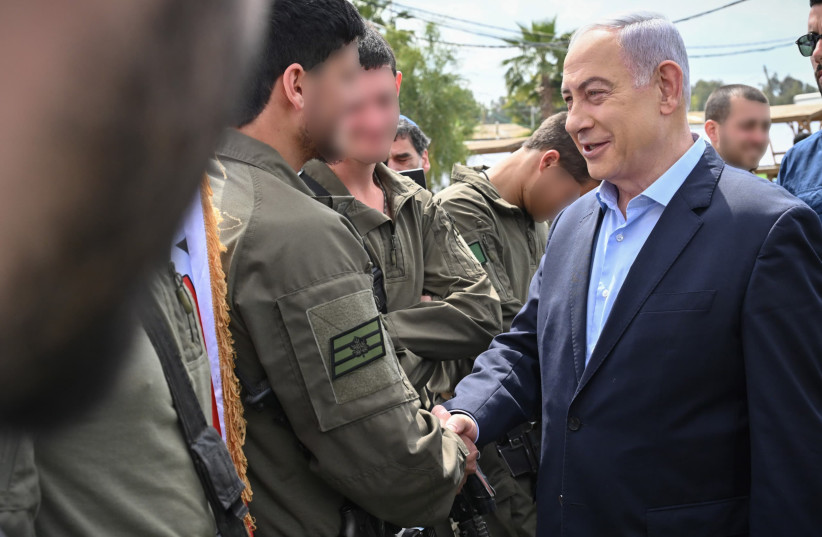As commander of the IDF’s 98th Division, IDF Brig.-Gen. Dan Goldfus effectively commands a full division of commandos. He was entrusted with the role of taking down Hamas’s Khan Yunis brigade – considered the toughest of them all, as it is home to the largest and most byzantine tunnel network in Gaza.
In two months, he destroyed most of Hamas’s fighting capability as a national military organization in the South.
He is considered by both the army and most media outlets to be one of the true war heroes and one of the IDF's most creative, domineering, and implacable commanders.
Goldfus is also viewed as having a certain stoicism. Whether under real enemy fire or the “fire” of aggressive journalists, he can remain calm and put his personal views aside, which is not a given.
This understanding makes his speech on Wednesday night all the more bizarre and appalling. Goldfus unleashed an onslaught on Israel’s political class in the last minute of an otherwise very carefully crafted - and pre-approved - speech.
Firm believer in equally carrying the burden.
He did not ask but rather demanded that the political class conduct themselves in a way that honors and is worthy of the sacrifice of the many soldiers he has lost under his command. He demanded that they ensure that the entire country (i.e., including haredim - ultra-Orthodox Jews) served equally in the military so that his fallen soldiers’ sacrifice would not be disrespected. Finally, he demanded that the political class work on policy and tone that would unite, not divide, the country.
Goldfus briefed me three times during the war, including one time on the front lines. I was also embedded with his commando units in Khan Yunis during the height of the fighting in December.
Although he is originally South African, you cannot tell he is not a native Hebrew speaker. He culturally comes off as the quintessential Israeli: daring and fearless. He answers questions crisply without being overly loquacious and gets to the point in a hurry.
One thing I did notice, though, was that he has little patience for nonsense.
Reporters can miss things that can only be gleaned from someone fresh off the battlefield. This creates a gap that, for someone fighting so resolutely in constantly life-risking conditions, can feel disconnected and be tiresome.
Not that Goldfus snapped when he lost patience with us; if anything, he went deeper into a stoic state, striking an even greater contrast. He physically stepped back, brought his hands to his sides as if signaling a willingness to hold back, and slowed down his speech as if using his body to do one large eye-roll – instead of snapping.

Even when he demanded a few items from the political class, he kept his demands to issues with a relatively large consensus. He did not hint at his personal politics or divisive issues.
And yet, he simply could not tolerate what he saw as the nonsense of many in the political class at the same time that his soldiers were dying heroically to protect the rest of us.
The truth is that everything Goldfus said out loud is something that I and other military reporters constantly hear from military officials quietly or with knowing stares and winks. The IDF, by press time, has defeated the vast majority of Hamas.
But weeks, if not months, have been squandered by the political class, unable to move forward with rebuilding Gaza in a way that will make it harder, if not impossible, for Hamas to return.
After just a few weeks, Goldfus returned this month to Khan Yunis to fight larger groups of Hamas fighters trying to rally together. These threats were larger than what was expected. And this is partially because of the power vacuum that exists in Gaza, a vacuum that stems from political decisions and diplomatic policies.
This means that regardless of which policy is best practically, there is a whole other side to this, which is political. But the issue of the power vacuum in Gaza is much more practically pressing than it is political: That is what politicians are failing to understand. New projects that are slowly chaffing away at Hamas’s monopoly on providing food and aid to Gazans could have happened at least a month ago.
New drafting plan angers sectors that already serve
Five weeks after the IDF rolled out its plan to increase military service, a plan which did not include the eligible haredim and angered most other sectors that already heavily serve, the government has still made no concrete move to address this massive manpower issue that will only grow with the war.
Soon, without changing this legal reality and fixing this historical injustice that manifests in real numbers, the majority of Israelis who serve will already need to be forced into longer service because time will have run out – and the war waits for no one.
Meanwhile, some well-known politicians regularly post to social media, attacking others while rarely contributing anything substantive to the war effort or uniting the country.
This is the zeitgeist of most of the IDF's higher echelons, but they refrain from saying it because they still feel a different level of honor while wearing the uniform, an honor many in the political class have long forgotten.
Goldfus said it out loud for one brief moment on Wednesday. Although he was summoned for a hearing, many in the political class may still be shaking in their boots – because inside, they know that most of the country agrees with the front-line commander.
